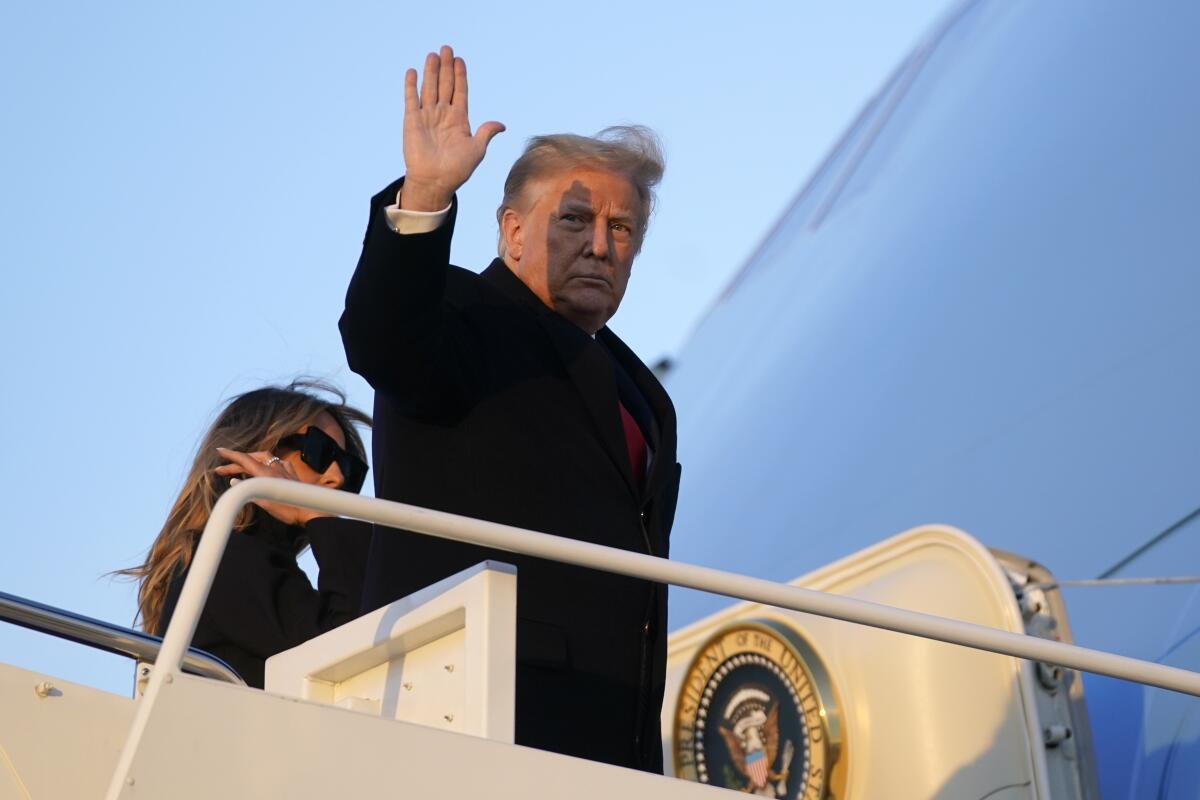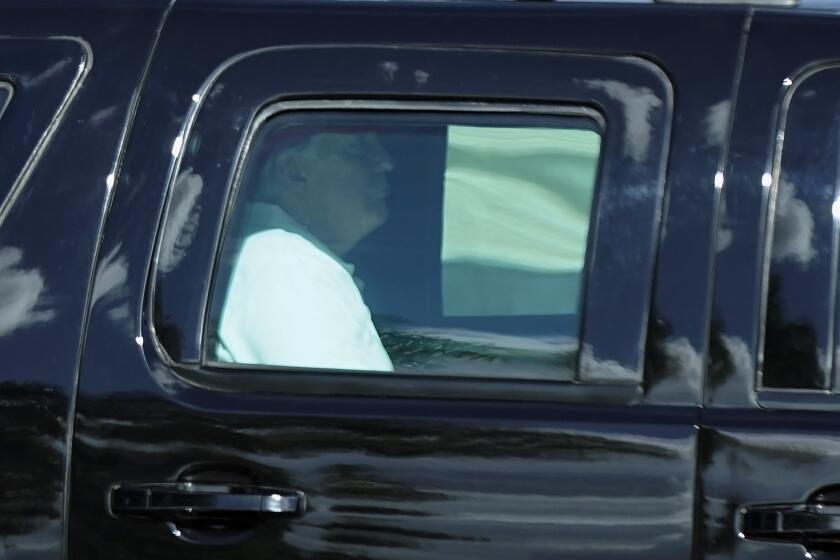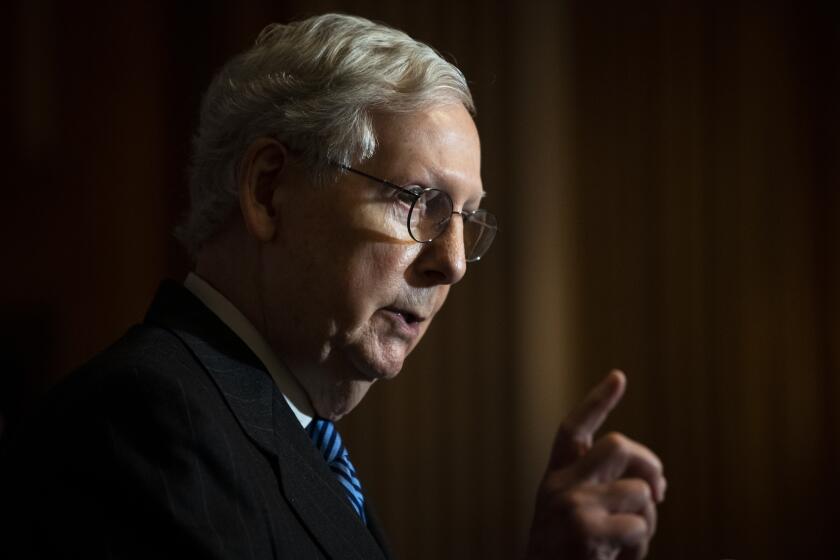Trump lashes out at GOP after override vote on defense bill

- Share via
WASHINGTON — President Trump lashed out at congressional Republicans on Tuesday after the House easily voted to override his veto of a defense policy bill.
A total of 109 Republicans, including Wyoming Rep. Liz Cheney, a member of GOP leadership, joined with Democrats on Monday to approve the override, which would be the first of Trump’s presidency. The Senate is expected to consider the measure later this week.
Trump slammed GOP lawmakers on Twitter, charging that “Weak and tired Republican ‘leadership’ will allow the bad Defense Bill to pass.″
Trump called the override vote a “disgraceful act of cowardice and total submission by weak people to Big Tech. Negotiate a better Bill, or get better leaders, NOW! Senate should not approve NDAA until fixed!!!″
The 322-87 vote in the House sends the override effort to the Senate, where the exact timing of a vote is uncertain.
Senate Majority Leader Mitch McConnell (R-Ky.) wants a vote as soon as Wednesday, but Vermont Sen. Bernie Sanders objected to moving ahead until McConnell allows a vote on a Trump-backed plan to increase COVID-19 relief payments to $2,000.
President Trump has failed to get Congress to amend a COVID relief bill or to back his veto of a defense bill. But he has disrupted Washington, and that’s his point.
“Let me be clear: If Sen. McConnell doesn’t agree to an up or down vote to provide the working people of our country a $2,000 direct payment, Congress will not be going home for New Year’s Eve,” said Sanders, an independent who caucuses with Democrats. “Let’s do our job.”
McConnell said Tuesday that approval of the $740-billion National Defense Authorization Act, or NDAA, is crucial to the nation’s defense and to “deter great-power rivals like China and Russia.’’
The bill “will cement our advantage on the seas, on land, in the air, in cyberspace and in space,” McConnell said. The bill also provides a 3% pay raise for U.S. troops, improvements for military housing, childcare and more, McConnell said.
“For the brave men and women of the United States Armed Forces, failure is not an option. So when it is our turn in Congress to have their backs, failure is not an option here either,” he said.
Trump rejected the defense measure last week, saying it failed to limit social media companies he claims were biased against him during his failed reelection campaign. Trump also opposes language that allows for the renaming of military bases that honor Confederate leaders.
House Speaker Nancy Pelosi (D-Calif.) said after the House vote that lawmakers have done their part to ensure the NDAA becomes law “despite the president’s dangerous sabotage efforts.’’
Trump’s “reckless veto would have denied our service members hazard-duty pay,” removed key protections for global peace and security and ”undermined our nation’s values and work to combat racism, by blocking overwhelmingly bipartisan action to rename military bases,” Pelosi said.
Sen. Jim Inhofe (R-Okla.), chairman of the Senate Armed Services Committee, said he was “disappointed” with Trump’s veto and called the bill “absolutely vital to our national security and our troops.”
“This is the most important bill we have,” Inhofe said Tuesday on the Senate floor. “It puts members of the military first.”
Pressure is mounting on the Republican-led Senate to follow the House, which voted overwhelmingly to increase the checks from $600 as the virus crisis worsens.
Trump has succeeded throughout his four-year term in enforcing party discipline in Congress, with few Republicans willing to publicly oppose him. The bipartisan vote on the widely popular defense bill showed the limits of Trump’s influence in the final weeks before he leaves office, and came minutes after 130 House Republicans voted against a Trump-supported plan to increase COVID-19 relief checks to $2,000. The House approved the larger payments, but the plan faces an uncertain future in the Republican-controlled Senate, another sign of Trump’s fading hold over Congress.
Besides social media and military base names, Trump also said the defense bill restricts his ability to conduct foreign policy, “particularly my efforts to bring our troops home.” Trump was referring to provisions in the bill that impose conditions on his plan to withdraw thousands of troops from Afghanistan and Germany. The measures require the Pentagon to submit reports certifying that the proposed withdrawals would not jeopardize U.S. national security.
The House veto override was supported by 212 Democrats, 109 Republicans and an independent. Twenty Democrats opposed the override, along with 66 Republicans and an independent.
The Senate approved the bill 84-13 earlier this month, well above the margin needed to override a presidential veto. Trump has vetoed eight other bills, but those were all sustained because supporters did not gain the two-thirds vote needed in each chamber for the bills to become law without Trump’s signature.
Rhode Island Sen. Jack Reed, the top Democrat on the Senate Armed Services Committee, said Trump’s declaration that China benefited from the defense bill was false. He also noted the shifting explanations Trump had given for the veto.
“From Confederate base names to social media liability provisions ... to imaginary and easily refutable charges about China, it’s hard to keep track of President Trump’s unprincipled, irrational excuses for vetoing this bipartisan bill,” Reed said.
Reed called the Dec. 23 veto “Trump’s parting gift to [Russian President Vladimir] Putin and a lump of coal for our troops. Donald Trump is showing more devotion to Confederate base names than to the men and women who defend our nation.”
The defense bill guides Pentagon policy and cements decisions about troop levels, new weapons systems and military readiness, personnel policy and other military goals. Many programs, including military construction, can only go into effect if the bill is approved.
More to Read
Get the L.A. Times Politics newsletter
Deeply reported insights into legislation, politics and policy from Sacramento, Washington and beyond. In your inbox twice per week.
You may occasionally receive promotional content from the Los Angeles Times.












